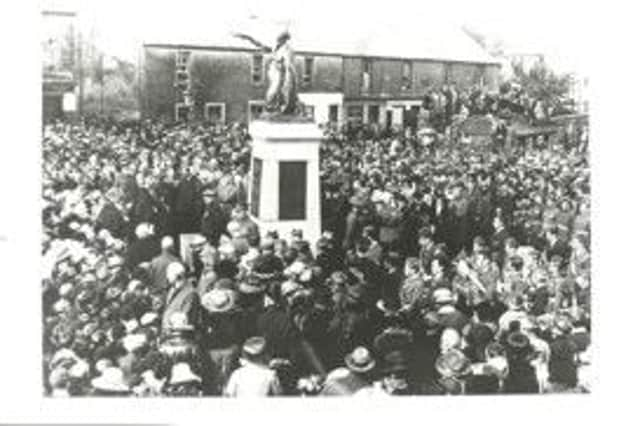Memories of home brought comfort to prisoner of war


Many local men took up the cause and joined the war effort as hostilities broke out in August 1914.
Almost a million from all over Britain enlisted in the fight, while many did not return home.
Advertisement
Hide AdAdvertisement
Hide AdIt is estimated that East Dunbartonshire — which at the time included a handful of villages now in North Lanarkshire — felt the loss of almost 1,000 souls.
The longing for home is something which all soldiers would have held dear and this was just as true for those leaving Milngavie.
Indeed for one local solider, his hometown and the family he left behind were the very things that kept his spirits during a dreaded period of captivity.
Advertisement
Hide AdAdvertisement
Hide AdLance Corporal William Craig Boyd was born in the town in 1889 and joined the Battalion of the Cameronians (Scottish Rifles) at the age of 21.
He was later sent out to France and fought in the Third Battle of Ypres in July 1917.
And though he got through the battles largely unscathed, his real fight was yet to come.
In March 1918, LCpl. Boyd was captured by German forces in Nesle, close to the battlefields of Somme, in northern France.
Advertisement
Hide AdAdvertisement
Hide AdHe remained a prisoner of war for the remainder of the conflict and often wrote home to describe the horrific experiences of his captivity.
Writing to his mother, he spoke of the ‘shameful treatment’ he endured but also his joyous response to the Armistice.
In September 1918, Boyd wrote: “The days are rolling on now; more than five months a prisoner of war and still waiting on a letter from home.
“There is not a day that passes but you are all in my mind.
“I am wearying to get to the end of this life of bondage and back once more to peace and comfort in Bonnie Scotland.”
Advertisement
Hide AdAdvertisement
Hide AdHis letters would always ask of his family; a little sister and his three brothers who were also serving with the Armed Forces in France.
He also made mention of his father fishing on the Allander River.
In a letter dated November 15, 1918, Boyd wrote: “Peace has come at last and you will all be overjoyed.
“I arrived in French territory today a freeman and I have been very hospitably treated by the French troops here.
Advertisement
Hide AdAdvertisement
Hide Ad“I am in fairly good health, in spite of the shameful treatment I received while in the hands of the Hun.”
“I hope you are all well and happily I expect to see you all soon.”
After the war LCpl. Boyd was commended for keeping up the spirits of his fellow soldiers amidst the horrors of the trenches and in the POW camp.
He returned home to Milngavie but struggled with the trauma of his experiences.
Advertisement
Hide AdAdvertisement
Hide AdOver the years, he discussed his captivity with son Craig who admits he still feels emotional about the events to this day.
Craig said: “Some of the stories of what he endured were truly horrendous and he was undoubtedly traumatised by it all.
“All the time he was in the camp, he refused to let it get him down and he was known for keeping the spirits up of all those who were imprisoned.”
LCpl. Boyd was moved into a number of areas across France and Germany.
Advertisement
Hide AdAdvertisement
Hide AdAt one camp, all the British captors were lined up outside the Commandant’s quarters where he asked if any had officer experience or could write.
The Lance Corporal put his hand up and was later given a job in the records office, keeping track of all the British prisoners.
Oddly, Boyd then struck up an unusual friendship with the Commandant Konrad Mueller with whom he stayed in contact with until the latter’s death in the 1970s.
When he was finally released from the camp, German officers simply opened the gates and pointed their captors in the direction of Allied soldiers.
Advertisement
Hide AdAdvertisement
Hide AdUpon his liberation, LCpl. Boyd turned and levelled one last insult of defiance to his former captors before marching off a free man.
He strolled miles across the countryside, but could not rid his mind of the trepidation he had been so accustomed to during war time.
When he and his men happened across fallen German soldiers, he instinctively picked up a bayonet from one of the bodies.
Craig explained: “There was no doubt about it, even though he was released he felt he would still need to defend himself at some point.”
Advertisement
Hide AdAdvertisement
Hide AdAlso along his route, LCpl. Boyd picked up unfired bullets from the ground and brought them home.
He then later melted down the rounds and made the metal into a model aeroplane for his son Craig.
“It really is the most beautiful thing,” he said. “Both the propellers and wheels move and though it is only about two inches long, it is something that I treasure.”
Though LCpl. Boyd is just one of the many soldiers who suffered during the Great War, his story resonates with all those who longed to have their family reunited.
Advertisement
Hide AdAdvertisement
Hide AdAnd though he was fortunate to return from the front, is poignant that the experiences stayed with him for the rest of his life.
But what is more important is that his story has shaped the lives of his relatives and continues to affect many to this day.